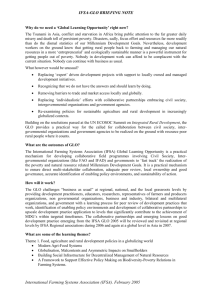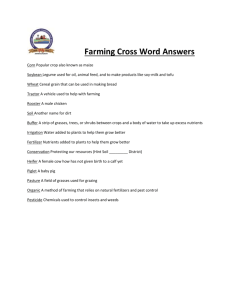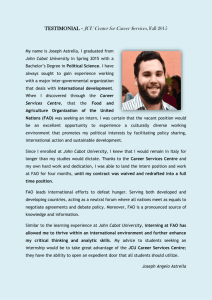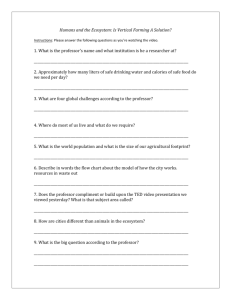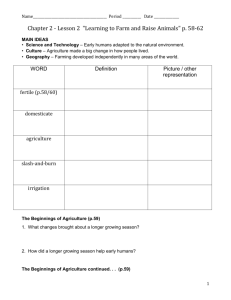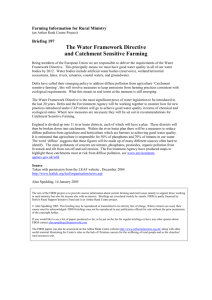Farming Systems and Poverty: Making a Difference
advertisement
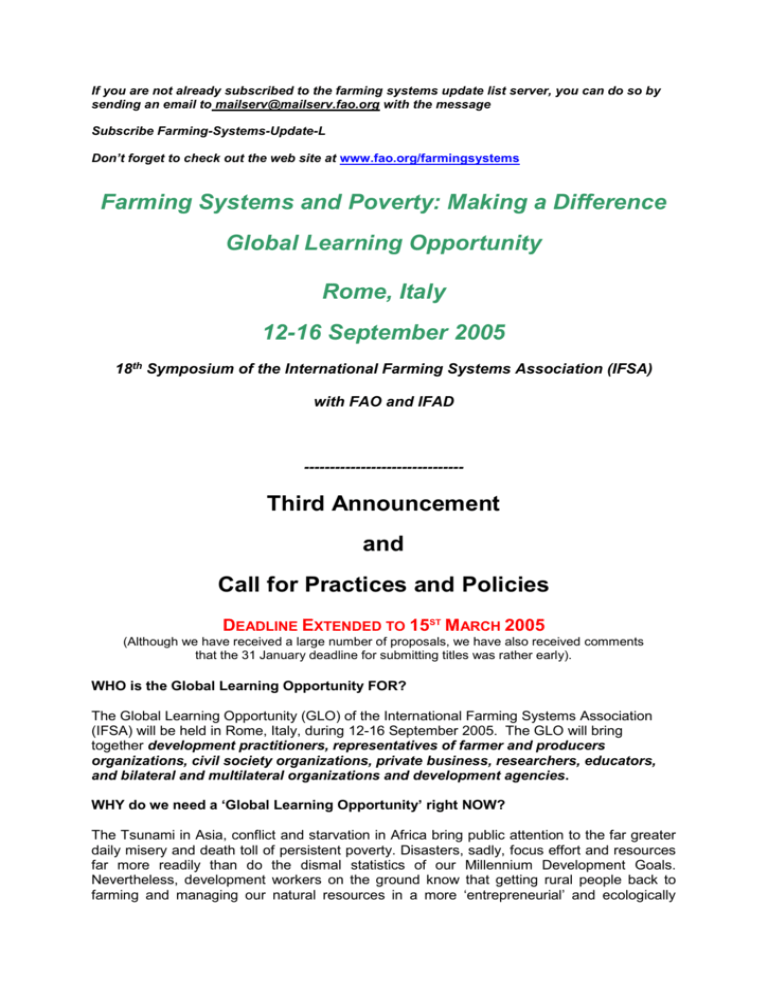
If you are not already subscribed to the farming systems update list server, you can do so by sending an email to mailserv@mailserv.fao.org with the message Subscribe Farming-Systems-Update-L Don’t forget to check out the web site at www.fao.org/farmingsystems Farming Systems and Poverty: Making a Difference Global Learning Opportunity Rome, Italy 12-16 September 2005 18th Symposium of the International Farming Systems Association (IFSA) with FAO and IFAD ------------------------------- Third Announcement and Call for Practices and Policies DEADLINE EXTENDED TO 15ST MARCH 2005 (Although we have received a large number of proposals, we have also received comments that the 31 January deadline for submitting titles was rather early). WHO is the Global Learning Opportunity FOR? The Global Learning Opportunity (GLO) of the International Farming Systems Association (IFSA) will be held in Rome, Italy, during 12-16 September 2005. The GLO will bring together development practitioners, representatives of farmer and producers organizations, civil society organizations, private business, researchers, educators, and bilateral and multilateral organizations and development agencies. WHY do we need a ‘Global Learning Opportunity’ right NOW? The Tsunami in Asia, conflict and starvation in Africa bring public attention to the far greater daily misery and death toll of persistent poverty. Disasters, sadly, focus effort and resources far more readily than do the dismal statistics of our Millennium Development Goals. Nevertheless, development workers on the ground know that getting rural people back to farming and managing our natural resources in a more ‘entrepreneurial’ and ecologically sustainable manner is a powerful instrument for getting people out of poverty. Nobody in development work can afford to be complacent with the current situation and nobody can continue with business as usual. HOW will it WORK? The GLO challenges “business as usual” at regional, national, and the local grassroots levels by providing a learning process for peer review of development practices that work, identification of enabling policy environments and development of collaborative partnerships to upscale development practice application to levels that significantly contribute to the achievement of MDG’s within targeted timeframes. The collaborative partnerships and emerging lessons on good development practice emerging from the IFSA GLO 2005 will be reviewed and revisited at regional levels by IFSA Regional Associations during 2006 and again at a global level in Asia in 2007. WHAT is the Format of the GLO? The GLO will be a highly participatory and interactive event building on a harvest of good practices and policies rooted in successful field experience. The event will consist of: presentations, dialogues and brainstorming through multi-stakeholder thematic round tables and panels interactive poster sessions open space workshops tools bazaars opportunities to initiate alliances and partnerships. HOW do you Express your Interest to Contribute? Send a title, authors and affiliations and a three-sentence summary of the round table, panel, open space workshop, tool, paper, poster, best practice-policy notes or other event being proposed to Farming-Systems@fao.org by March 15, 2005 IMPORTANT DATES March 15, 2005 Proposed Titles and summaries of events due March 31, 2005 Letters of acceptance of title summary proposals July 31, 2005 Final papers and event outlines for incorporation into Pre-Event Proceedings WHAT are the THEMES? Overall challenge theme -- Farming systems and poverty: making a difference “Farming systems and poverty: making a difference” combines the IFSA mandate with the title of the influential FAO-World Bank publication on “Farming Systems and Poverty: Farmers’ Livelihoods in a Changing World”, and reflects priority issues for major stakeholders. Some major thrusts for the Symposium could be: mainstreaming of good practices, including the differentiation of knowledge and responses by different farming systems; partnership strengthening, including opportunities for creating new partnerships during the Symposium; and mobilizing resources for sustainable agricultural and rural development (SARD), including local, national and international investments. Other key contributions of the GLO would include: improved CSO interaction with S&T community on SARD; greater contact lists for regional information exchange; enhanced local knowledge swapping, knowledge pooling and lesson learning; and local peer-to-peer communication for innovation and learning at national and local grassroots levels; and further collaboration between CSO, IGO, private sector and Governments. The themes add value to ongoing dialogue and emerging issues on the effectiveness of development approaches and provide platforms and options for launching field-level actions. Theme 1 -- Food, Agriculture and Rural Development Policies in a Globalizing World Innovations in policy are a priority concern for many stakeholders in the context of globalization, structural adjustment, decentralization and privatization processes which have contributed to the reduction or even withdrawal of Government support from the agricultural and rural sector and the collapse of services to farmers. Farming systems practitioners can report impacts on smallholders, exciting R&D work in the field, debate good practice and the ‘State-of-the-Art’, and demonstrate contributions to the World Food Summit and Millennium Development Goals. Theme 2 – Trade and Market Linkages From the pervasive impacts of increasing trade liberalization on farmers and consumers, lessons can be drawn and ways forward identified. One core element of this theme is farmermarket linkages within the overall context of growing concentration of agro-industry. A richer understanding is needed of the complexity of supermarkets and market chains for small producers and urban consumers; the impacts of pro-poor global trade agreements; the growth of local, organic and fair trade food systems; the effects on food safety and quality; and the markets for seeds and other farm inputs. The synthesis of field experience on impacts on smallholder farming families, the rural poor, or the landless poor (what works; what does not work) would contribute to the identification of appropriate targeted policy responses (above). Theme 3 -- Knowing and Learning Processes Understanding how rural people learn and share experiences, in what context and learning infrastructure and with which tools has replaced the paternalistic client-orientation of rural development during the 1970s-1980s. One challenge is to strengthen entrepreneurial capacity for peer-to-peer knowing and learning for better decision making in poor farm households in complex systems, based on experiences with local multi-stakeholder collaborative learning at the field level in SARD, NRM, marketing, demand-driven advisory and research services. Theme 4 -- Development Strategies, Pathways and Synergies Based on the characterization of farming systems and an understanding of their dynamics, differentiated context-specific development pathways can be identified around which multistakeholder alliances and public-private partnerships (e.g., CSO, inter-governmental organizations, governments, private sector, etc) could coalesce. A challenge is to foster and mainstream such targeted partnerships with guidelines, regulations and investment practices. Such alliances are required for managing ecosystems and landscapes from farms to catchments, intensification strategies, environmental services, landcare, conservation of the natural resource base and biodiversity, livelihoods diversification, conservation agriculture, eco-agriculture, urban agriculture, and linking mitigation, risk and response for vulnerable systems and populations, including HIV-AIDS. Who is IFSA? The International Farming Systems Association (IFSA) is a non-profit professional association of more than twenty years, built on the challenge 'to give voice to small farmers'. IFSA comprises active regional associations or groups of professionals in Australia & the Pacific, Africa-East & Southern, Africa-West, Asia, Europe, Latin America, North Africa & Middle East and North America. Their memberships represent bio-physical and social science disciplines and include agricultural policy makers, researchers, extension workers and farmers. The IFSA mandate is: “To move beyond doing good research to making a difference to the lives of small farmers’ and the rural poor.” WHO to contact for further INFORMATION For general enquiries to the organizers use: farming-systems@fao.org The following list of focal points can assist with obtaining further information. IFSA Board Clive Lightfoot (President) clive.lightfoot@linkinglearners.net Nadarajah Sriskandarajah (Europe) sri@kvl.dk VoTong Xuan (Asia) v.xuan@cgiar.org Jeff Mutimba (Africa–Eastern & Southern) jeff.mutimba@africaonline.co.ug Mamadou Ouattaram (Africa–Central & Western) ouattaram.safgrad@cenatrin.bf Christine King (Australia & Pacific) christine.king@uq.edu.au Sergio Pinheiro (Latin America) pinheiro@epagri.rct-sc.br Nour Sellamna (Middle East & North Africa) sellamna@agropolis.fr Sue Ellen Johnson (North America) sejohnson@smallfarm.org Constance Neely (Networking) constance.neely@fao.org John Dixon (Information) johnmzdixon@hotmail.com Rome Based Working Group Thomas Price (Focal Point) thomas.price@fao.org Marcelino Avila marcelino.avila@fao.org Christine HoldingAnyonge christine.holdinganyonge@fao.org Pieter VanLierop pieter.vanlierop@fao.org Ahmed Sidahmed a.sidahmed@ifad.org We will be sending important information on the conference venue, accommodation and registration in further announcements. We look forward to your participation in the IFSA 18th Symposium and Global Learning Opportunity. We would appreciate your forwarding to friends and colleagues who might be interested in the Global Learning Opportunity. If you are not already subscribed to the farming systems update list server, you can do so by sending an email to mailserv@mailserv.fao.org with the message Subscribe Farming-Systems-Update-L
